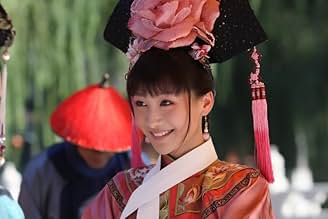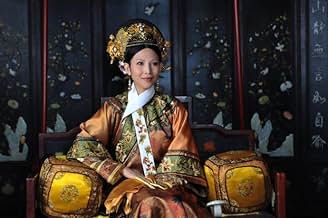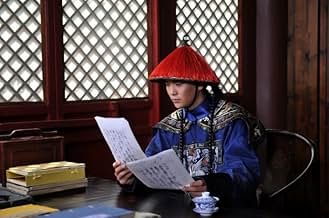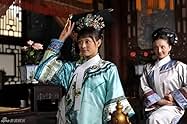A young woman born in Eight Banners' family marries the Emperor of the Qing Dynasty. After surviving through many murderous scandals and betrayals, she prevails as the most powerful woman in... Read allA young woman born in Eight Banners' family marries the Emperor of the Qing Dynasty. After surviving through many murderous scandals and betrayals, she prevails as the most powerful woman in the Emperor's harem, the Empress dowager.A young woman born in Eight Banners' family marries the Emperor of the Qing Dynasty. After surviving through many murderous scandals and betrayals, she prevails as the most powerful woman in the Emperor's harem, the Empress dowager.
- Awards
- 35 wins & 10 nominations total
Browse episodes
Featured reviews
My review and ratings depends on which "Empresses in the Palace" you are seeing. I started off watching the "complete series" in English, which consisted of 6 episodes on Prime Video. It, certainly, whet my appetite for more. I found it very interesting, but it seemed to jump too quickly from one scene and crisis to another. So, I gave it a 7, and looked for more. I found that it is a series consisting of 76 episodes! No wonder it seemed "off." How do you shrink a 76 hour program into 6 hours? The answer, not very well. Was it still entertaining, yes, but not great. The acting was great. Locations inside The Forbidden City outstanding. But, the story was just not smooth.
The 76 episodes version, on the other hand, were wonderful! I only got to see about 47 episodes, but the story was consistently terrific. I got to know and care about the characters. I watched them grow, age, mature, and change as life within the harem of the Emperor grew more and more complicated, as emotion, power, greed, and jealousy shaped their lives. And I, suddenly, understood those gaps in the "complete series."
The original episodes I got to see were on YouTube. They had English subtitles that were the work of a group to translate them all into English subtitles.
I check back every few weeks to see if more episodes have been added to those with English subtitles. They are over half way through, and I really hope they continue, because it's a 10, and well worth watching!
Think of the "complete series" as cliff notes!
The 76 episodes version, on the other hand, were wonderful! I only got to see about 47 episodes, but the story was consistently terrific. I got to know and care about the characters. I watched them grow, age, mature, and change as life within the harem of the Emperor grew more and more complicated, as emotion, power, greed, and jealousy shaped their lives. And I, suddenly, understood those gaps in the "complete series."
The original episodes I got to see were on YouTube. They had English subtitles that were the work of a group to translate them all into English subtitles.
I check back every few weeks to see if more episodes have been added to those with English subtitles. They are over half way through, and I really hope they continue, because it's a 10, and well worth watching!
Think of the "complete series" as cliff notes!
This series is a kind of Chinese equivalent of Tudors which is one of my favorite historic TV series. There is much common with Tudors: most of the story plays out in the Emperors court that is full of intrigues, plots and beautiful women. Also it falls largely into the similar sort of era: 17th century if I understand correctly,Henry's life was a bit earlier but not too much.
Also the Emperor is similar sort of fella to our Henry: right old moron, serial wife killer and a sociopath. And the directors/script writers take is the same: they are creating a believable historic world but are not too worried to follow every historic fact to the dot. The story is loosely based on some real peoples lives but obviously a lot of artistic freedom is taken to create this story.
There is a lot to love about this series: it is really well written and directed and it never gets dull. The scriptwriter surely knows how to create cliff hangers and keep the audiences on their toes. The Chinese people are known to be very medicoulos in everything throughout the history and the director proves that: he firmly guides his massive amount of main and side characters through vast amounts of plot twists and still manages to remember the character continuity details for each one of them.
What I also liked very much, the character development is as deep as in a feature movie. Often in series characters remain sketch-like whilst here the director digs deep into the human depth with all the main ladies. Also the character development is very thorough and well planned, revealing layer by layer every ones true nature (Empress, Consort Hua, Lady Cao) or character changes (Zhen Huang).
It would have been very easy just to show these women as evil scheming bitches, but the director shows the depth of human tragedy how they were caught up in the evil infrastructure where they often had no choice as to resort to evil methods to survive. Every important characters personal story is revealed layer by layer and how they came to the point where they were in the story.
What I found particularly fascinating was all the customs and rituals of the palace. It seems that a lot of historical research had gone into that production. I doubted if they really dressed and behaved in such peculiar ways, such as women wearing these long finger extentions for example. So I did some research online. And indeed, at these times aristocratic women wore those weird things, as sign that they did not have to work. They were common accessories.
I found it very amusing how they all offered each other bowls of soups, teas and medicines all the time, half of them poisoned or laced with something very harmful - either making you infertile, destroying your voice, infecting you with plague. A lethal plum soup was funniest.
Everyone in the palace was busy sending each other medicines, teas, fabrics, jewellery, fragrances, pot plants, precious stones, incense, all of them meant to manipulate the target one way or other.
Killing each other off in most brutal ways was also common place in palace, and almost in every episode a person is beaten to death either on order of Emperor or other high standing person. The concubines and female servants are beaten to death at the same rate as male subjects.
As for the weaknesses of the series,the weakest link in the whole story is the actor who plays the Emperor. Where did they get him from? They have the whole China to choose from,why did they choose him???? The female leads tear the screen apart like she-wolves but he is like out of amateur theatre.
He is so wooden. He simply delivers the lines and that's about it. He has no emotions, no reactions and no concept of his character. Now and then, on the orders of the director apparently, he throws a bowl on the floor to show he is angry. On his death bed he rolls his eyes left and right a few times. That's it! And he was not good-looking either, so there was nothing to compensate his boring and dull presence. This actor really annoyed the hell out of me.
In a way, he reflects the principle of the society that is portrayed in the series: the female actresses work so hard to create exciting characters and he is just sitting there like a Muppet, has not put any effort into his character, yet holds a lead role in major TV series.
But in spite of disappointing Emperor, it is still very exciting series. And I very much recommend to watch the original 76 episodes, not the 6 part short version. There are so many story lines and details and 6 part version is not doing justice to this exciting 76 episode series.
Also the Emperor is similar sort of fella to our Henry: right old moron, serial wife killer and a sociopath. And the directors/script writers take is the same: they are creating a believable historic world but are not too worried to follow every historic fact to the dot. The story is loosely based on some real peoples lives but obviously a lot of artistic freedom is taken to create this story.
There is a lot to love about this series: it is really well written and directed and it never gets dull. The scriptwriter surely knows how to create cliff hangers and keep the audiences on their toes. The Chinese people are known to be very medicoulos in everything throughout the history and the director proves that: he firmly guides his massive amount of main and side characters through vast amounts of plot twists and still manages to remember the character continuity details for each one of them.
What I also liked very much, the character development is as deep as in a feature movie. Often in series characters remain sketch-like whilst here the director digs deep into the human depth with all the main ladies. Also the character development is very thorough and well planned, revealing layer by layer every ones true nature (Empress, Consort Hua, Lady Cao) or character changes (Zhen Huang).
It would have been very easy just to show these women as evil scheming bitches, but the director shows the depth of human tragedy how they were caught up in the evil infrastructure where they often had no choice as to resort to evil methods to survive. Every important characters personal story is revealed layer by layer and how they came to the point where they were in the story.
What I found particularly fascinating was all the customs and rituals of the palace. It seems that a lot of historical research had gone into that production. I doubted if they really dressed and behaved in such peculiar ways, such as women wearing these long finger extentions for example. So I did some research online. And indeed, at these times aristocratic women wore those weird things, as sign that they did not have to work. They were common accessories.
I found it very amusing how they all offered each other bowls of soups, teas and medicines all the time, half of them poisoned or laced with something very harmful - either making you infertile, destroying your voice, infecting you with plague. A lethal plum soup was funniest.
Everyone in the palace was busy sending each other medicines, teas, fabrics, jewellery, fragrances, pot plants, precious stones, incense, all of them meant to manipulate the target one way or other.
Killing each other off in most brutal ways was also common place in palace, and almost in every episode a person is beaten to death either on order of Emperor or other high standing person. The concubines and female servants are beaten to death at the same rate as male subjects.
As for the weaknesses of the series,the weakest link in the whole story is the actor who plays the Emperor. Where did they get him from? They have the whole China to choose from,why did they choose him???? The female leads tear the screen apart like she-wolves but he is like out of amateur theatre.
He is so wooden. He simply delivers the lines and that's about it. He has no emotions, no reactions and no concept of his character. Now and then, on the orders of the director apparently, he throws a bowl on the floor to show he is angry. On his death bed he rolls his eyes left and right a few times. That's it! And he was not good-looking either, so there was nothing to compensate his boring and dull presence. This actor really annoyed the hell out of me.
In a way, he reflects the principle of the society that is portrayed in the series: the female actresses work so hard to create exciting characters and he is just sitting there like a Muppet, has not put any effort into his character, yet holds a lead role in major TV series.
But in spite of disappointing Emperor, it is still very exciting series. And I very much recommend to watch the original 76 episodes, not the 6 part short version. There are so many story lines and details and 6 part version is not doing justice to this exciting 76 episode series.
I am British but have no time for our TV soap operas such as Eastenders and Coronation street but having watched Empresses in the Palace I have gone on to watch many Chinese TV dramas. It is very colourful and also in the main very well acted. The twists and turns in the plot held my interest all the way through and I was genuinely deflated when I came to the end. I particularly like the acting of the star Sun Li (Susan Sun) who manages to portray ageing often with just her posture or movement, and also has a convincing range of emotional expression. I would highly recommend this if you like booing pantomime villains and have an interest in colourful well dressed drama.
This is a Chinese TV series which had 76 episodes. This is a choppy version of the series with huge gaps in what and why things are happening. The original version is on YouTube, but only 35 episodes have been translated into English so far. I liked this version, but was left scratching my head at the end.
I was very disappointed, which is why I went looking for more and found the information about the series AND its availability on YouTube. There is a group of volunteers who are supplying the English translations. They say that it takes about 2 weeks per episode to add the English, I'll be waiting for them! It's a terrific series in its original form.
I was very disappointed, which is why I went looking for more and found the information about the series AND its availability on YouTube. There is a group of volunteers who are supplying the English translations. They say that it takes about 2 weeks per episode to add the English, I'll be waiting for them! It's a terrific series in its original form.
Rich, captivating and enthralling. I just finished the entire show... I am at a loss for words for the beauty and cruelty of it all. Bravo!
Did you know
- TriviaThe Yongzheng emperor in reality only ruled for 12 years
- GoofsAt the temple, Zhen Huan performs regular hard labour of chopping wood, carrying water, scrubbing floors and doing laundry. Yet her fingernails remain long and perfectly manicured throughout.
- Quotes
Yongzheng Emperor (2011): Only by enduring loneliness, can someone enjoy constancy.
- ConnectionsAlternate-language version of Empresses in the Palace (2015)
- How many seasons does Empresses in the Palace have?Powered by Alexa
Details
Contribute to this page
Suggest an edit or add missing content





































